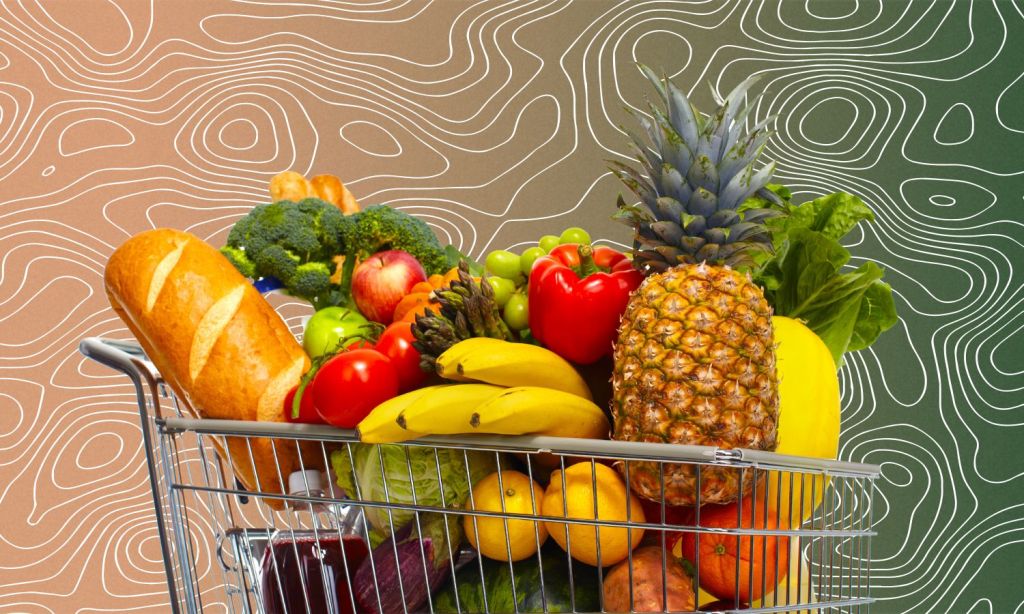We’ve all been there. You think you’ve run out of food, so you brace yourself for the after-work madness of a grocery shop. You tell yourself you’ll remember everything you need without writing it down, and you get to the shops just to be overwhelmed with choices. You’re on an empty stomach so you just pick up anything that sounds good, promising that you’ll use it all. You return home with your haul of goods, only to find yourself throwing some of it out a week or two later, because you can’t even remember why you bought it. Trying to save money on groceries might feel like an endless goal, but it can be achieved before you even leave the house.
Smarter grocery shopping has plenty of benefits for you and your family. You save money by only getting what you need (and save space in your fridge and pantry). You also help to look after the planet because, if you only buy what you need, you’re less likely to be wasting food. According to the National Food Waste Strategy Feasibility Study Final Report 2021, the average Australian household throws away up to $2,500 worth of food a year, and cutting down that number can start with a plan of attack for your next grocery shop.
Suncorp Bank and OzHarvest have teamed up to help you become a food savings champion, arming you with the tools to get the most out of your meals. So, here are some tips to help you become a smart shopper, helping to save food, money and the planet.
Write that Shopping List
Trust us, you’ll thank yourself later. Even buying that one extra Hass avocado each week, which you end up throwing out because you thought you might need it, could cost you $65 a year^. The best way to avoid this is to plan your shops meticulously with a list. If you plan your meals for the week ahead, you’ll be able to buy just the quantities of ingredients you’ll need. This means you’ll be minimising your food waste and not wasting money on food that won’t get eaten. Sounds like a win-win to us.
^ Food item prices are based on average online prices published by two major supermarkets on 18th September 2023 in Brisbane, Queensland. Food item prices are subject to change.
Avoid the Ever-Tempting Impulse Buy
Maybe you’re the type of person who adds more to your cart just to secure that free shipping. These sneaky ways that stores encourage you to spend more are always tempting, but have you ever considered how much a good deal is adding to your food waste? A 2-for-1 deal sounds great in theory, but if you don’t use both products, then some can end up in the bin. Not the best way to avoid food waste or save money on groceries. Try not to be tempted by deals for things you weren’t already intending to buy — and your wallet and the planet will thank you in the long run.
Pop It In the Freezer
The freezer might be seen as a last-resort saviour of food that might be at the end of its shelf-life, but it’s also worth freezing portions of your grocery shop haul the minute you get home. Portioning is a really vital element of saving food, but sometimes ingredients may only be available in bulk. Take strawberries, for example. You might buy a punnet thinking you’ll snack on them before it’s too late. Life gets in the way, and you end up throwing a third of the punnet out. Do that every week, and you could waste up to $34^. Instead, why don’t you consider portioning some of the punnet off in the freezer, so you can enjoy it in smoothies or even a dessert?
^ Food item prices are based on average online prices published by two major supermarkets on 18th September 2023 in Brisbane, Queensland. Food item prices are subject to change.
Versatility is Key
Focusing on buying versatile ingredients, like the aforementioned strawberries, will also help you maximise your haul’s shelf-life. Planning meals that involve similar ingredients can help make sure that, even if you do have to buy a lot of any one thing, you still get to use it all and minimise your food waste. If you plan on buying a roast chicken to have with dinner, portion it out, store it correctly and save some for a salad the next day. Chuck some in a wok with some sauces and veggies to make a stir-fry later that week. You’ll not only get the most out of the food you’re buying, but you’ll get the most bang for your buck.
Shop Ugly
It’s time to unlearn whatever has taught you to go for the prettiest produce. Plenty of stores will sell “ugly” or imperfect produce at a more affordable price, which is an instant win. On top of that, these fruits and veggies are just as tasty and nutritious as their “prettier” counterparts. By opting for imperfect produce, you’re supporting efforts to use more of the harvest, reducing the environmental impact associated with discarding perfectly edible food based on appearance.
Mastering the art of the grocery shop can set you well on your way to becoming a food savings champion, as well as encourage you to save money on groceries in general. But to take your food-saving skills to that next level, check out the Suncorp Bank Food Savings Challenge. Not only will you find a slew of resources and other tips, including some from cook and author Khanh Ong, but you’ll also be able to take a quick food savings quiz that’ll outline how well you’re currently doing, and encourage ways to improve.
Now, get to conquering that next grocery shop.

